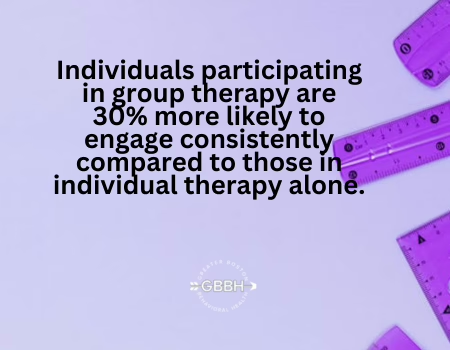Mental health challenges can feel overwhelming, but no one needs to face them alone. Group therapy is an essential form of mental health treatment that allows individuals to support each other in a safe, structured setting. With the guidance of a trained therapist, participants share experiences, learn coping strategies, and grow together. In this blog post, we’ll explore what group therapy is, how it works, and why it plays a crucial role in mental health programs.
What Is Group Therapy?
Group therapy is a type of therapy where multiple individuals with similar mental health issues come together to work towards common goals. Sessions are led by a therapist who specializes in group dynamics and mental health treatment. The group environment fosters shared learning, mutual support, and a sense of community among participants.
This form of therapy is commonly used in mental health treatment centers in Massachusetts and around the world. It’s a complementary approach, often integrated with other treatments like individual therapy or medication. Group therapy sessions provide a space where individuals can safely express their feelings, share personal stories, and learn from others in a similar situation.
How Does Group Therapy Work?
Group therapy follows a structured format, ensuring that everyone benefits from the experience. Here’s a typical breakdown of how sessions usually flow:
- Opening and Introductions
At the start of each session, the therapist welcomes everyone and encourages brief introductions. For new members, this is a crucial step in building trust and comfort within the group. - Guided Discussion
After the introductions, the therapist may introduce a theme or specific topic related to the group’s needs, such as managing anxiety, improving communication, or coping with trauma. Participants are invited to share their thoughts, feelings, and personal experiences in relation to the topic. - Interactive Exercises or Skill Development
In some sessions, the therapist may introduce interactive activities, like role-playing or mindfulness exercises. When using cognitive-behavioral therapy (CBT), participants might work on challenging negative thought patterns or learning more positive coping strategies. Dialectical behavior therapy (DBT) is also frequently used, focusing on emotional regulation and interpersonal effectiveness. - Feedback and Reflection
As the session winds down, group members are often encouraged to reflect on what they’ve learned. This allows individuals to provide feedback and discuss how they plan to apply new skills in their everyday lives.
Group therapy can last anywhere from 60 to 90 minutes, and groups typically meet weekly. Depending on the participants’ needs, some groups are ongoing, while others are time-limited, lasting for a set number of weeks.
Types of Group Therapy Offered at GBBH
At Greater Boston Behavioral Health, we offer various group therapy formats to meet the unique needs of our clients:
1. Psychoeducational Groups
These groups focus on educating participants about their mental health conditions and providing tools to manage them effectively. Topics may include:
- Understanding anxiety triggers in an Anxiety Treatment Program.
- The impact of trauma on the brain in a Trauma Therapy Program.
- Coping mechanisms for managing depression in a Depression Treatment Program.
2. Skills-Based Groups
Skills-based groups emphasize developing practical tools for managing emotions, relationships, and stress. Examples include:
- Anger Management Programs to help participants learn constructive ways to handle frustration.
- Emotional regulation techniques from DBT.
- Social skills training for improving interpersonal relationships.
3. Support Groups
Support groups provide a safe space for participants to share their experiences, offer encouragement, and receive peer support. These groups are especially helpful for individuals in recovery from trauma or depression.
4. Process-Oriented Groups
Process groups focus on exploring emotions and relationships in-depth. Participants share their thoughts and feelings as they arise, with guidance from the therapist to foster insight and growth.
5. Family Therapy Groups
Family involvement is critical to recovery. Family Therapy Programs help loved ones understand mental health challenges and learn how to provide support effectively.
Common Therapeutic Approaches in Group Therapy
Various therapeutic models are used in group therapy depending on the participants’ needs. Some common approaches include:
- Dialectical behavior therapy (DBT)
Dialectical behavior therapy is another approach often used in group therapy. DBT is particularly effective for individuals dealing with intense emotions, such as those with borderline personality disorder. The group setting allows participants to practice emotional regulation and distress tolerance while receiving support from others who face similar challenges. - Supportive Group Therapy
In this more relaxed form of group therapy, the emphasis is on mutual support. The therapist facilitates discussion, but the focus is on participants sharing their experiences and offering encouragement to one another. This type of therapy is often used alongside other more structured therapeutic approaches.
Benefits of Group Therapy
Group therapy offers unique advantages that enhance individual therapy and other forms of mental health treatment. Here’s how group therapy can transform the recovery process:
1. Reducing Isolation and Building Connection
Mental health challenges can leave individuals feeling isolated. Group therapy provides a sense of community, showing participants that they are not alone in their struggles. These connections:
- Foster a sense of belonging and reduce loneliness.
- Build mutual support networks that extend beyond therapy sessions.
- Encourage individuals to open up and share their experiences.
2. Learning from Others
Participants in group therapy gain valuable insights from hearing others’ stories. This shared learning:
- Highlights new coping strategies and perspectives.
- Normalizes feelings and experiences, reducing self-judgment.
- Offers inspiration and hope by witnessing others’ progress.
3. Practicing Social Skills in a Safe Environment
Group therapy serves as a practice ground for improving interpersonal relationships. Participants learn to:
- Communicate more effectively.
- Set healthy boundaries.
- Resolve conflicts constructively.
These skills are especially beneficial in programs like Anger Management Programs and Family Therapy Programs.
4. Providing Emotional Support
The empathy and encouragement shared in group therapy can be profoundly healing. Participants often feel understood and validated, which can:
- Boost self-esteem and confidence.
- Create a foundation for emotional resilience.
- Enhance motivation to continue treatment.
5. Enhancing Therapy Outcomes
Group therapy complements individual therapy by reinforcing lessons and skills. For example:
- Individuals in Trauma Therapy Programs can process emotions in both one-on-one and group settings.
- Those in Depression Treatment Programs benefit from the camaraderie and accountability of group therapy.
6. Cost-Effectiveness
Compared to individual therapy, group therapy is often more affordable while still providing meaningful therapeutic benefits. This makes it an accessible option for individuals seeking high-quality care.
How Group Therapy Fits into Comprehensive Treatment Plans
At GBBH, group therapy is integrated into broader treatment plans to ensure a holistic approach to mental health recovery. Here’s how it fits into different levels of care:
1. Partial Hospitalization Programs (PHP)
Group therapy is a core component of PHP, where participants receive intensive, daily treatment. It helps individuals in crisis stabilize their emotions and build coping skills.
2. Intensive Outpatient Programs (IOP)
For individuals transitioning from PHP or needing more flexibility, IOP includes group therapy sessions several times a week. These sessions provide continued support while allowing participants to manage work or family responsibilities.
3. Mental Therapy Programs
Group therapy complements individual therapy and specialized treatments like CBT, DBT, and Trauma Therapy Programs, creating a comprehensive care plan.
Who Can Benefit from Group Therapy?
Group therapy is effective for individuals facing a variety of mental health challenges, including:
- Anxiety Disorders: Reducing social fears and providing tools to manage worry.
- Depression: Offering peer support to combat feelings of isolation and hopelessness.
- Trauma: Providing a safe space to process painful experiences.
- Anger Management: Teaching constructive ways to handle frustration and conflict.
Group therapy is also beneficial for individuals seeking a sense of community and support as they navigate their recovery journey.
Is Group Therapy Right for You?
Group therapy can be an effective form of treatment for many, but it’s important to assess if it’s the right fit for you. If you are open to sharing your thoughts and experiences in a group setting and feel comfortable engaging with others, group therapy can be a fantastic option. For those who prefer privacy or are not yet ready to open up to others, individual therapy might be a better initial step.
If you are considering group therapy, it’s helpful to consult with a therapist or counselor at a mental health treatment center in Massachusetts to discuss your needs and determine if it aligns with your treatment goals.
Why Choose Greater Boston Behavioral Health for Group Therapy?
At Greater Boston Behavioral Health, we are committed to providing high-quality, compassionate care tailored to each individual’s needs. Here’s why our clients trust us:
1. Expert Therapists
Our licensed therapists have extensive experience facilitating group therapy sessions and creating a safe, supportive environment.
2. Comprehensive Services
From Mental Health Programs to Family Therapy Programs, we offer a wide range of treatment options to address diverse needs.
3. Flexible Levels of Care
Whether through PHP, IOP, or outpatient services, we provide the right level of support for every stage of recovery.
4. Convenient Location
As a leading Mental Health Treatment Center in Boston, we are dedicated to serving individuals throughout the region with accessible, top-quality care.
Take the First Step Toward Recovery
Group therapy is a powerful tool for healing and growth, offering connection, support, and opportunities to learn and practice new skills. At Greater Boston Behavioral Health, we’re here to guide you on your journey to recovery.
Contact us today at (888)278-0716 to learn more about our Group Therapy Programs, Mental Health Programs, and other services. Together, we can help you build a brighter, healthier future.
Conclusion
Group therapy is a valuable tool in modern mental health care, providing individuals with the chance to grow, heal, and connect in a supportive environment. Whether through cognitive-behavioral therapy, dialectical behavior therapy, or other approaches, group therapy has proven to be effective in improving emotional well-being and fostering a sense of community.
If you’re considering joining a mental health therapy program, exploring group therapy as part of your treatment plan may offer the support and skills you need to navigate your mental health journey successfully. Call us today at (888)278-0716 to learn more about our programs and start your journey toward emotional well-being.
FAQ on Group Therapy
What mental health conditions does group therapy address?
Group therapy is effective for anxiety, depression, trauma, anger management, and more. It’s commonly included in programs like Anxiety Treatment Programs, Trauma Therapy Programs, and Depression Treatment Programs.
How does group therapy complement individual therapy?
Group therapy enhances individual therapy by providing peer support, opportunities to practice social skills, and shared insights that enrich the recovery process.
Who can benefit from group therapy?
Anyone experiencing mental health challenges, such as anxiety, depression, or trauma, can benefit. Group therapy is also ideal for individuals seeking community and support during their recovery journey.
Is group therapy confidential?
Yes, confidentiality is a cornerstone of group therapy. Therapists set clear rules to ensure a safe and private environment for all participants.
How does group therapy fit into a treatment plan?
Group therapy is often integrated into Partial Hospitalization Programs (PHP) and Intensive Outpatient Programs (IOP) to provide a comprehensive approach to mental health care.


